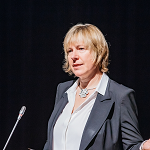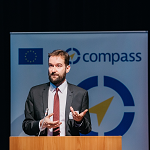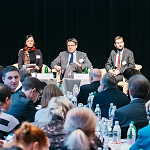Financial Instruments delivering ESI Funds
Overview
On 21 January 2016, financial instruments delivering ESI Funds were discussed at a seminar in Ljubljana, Slovenia. This seminar is part of a series of national seminars that will have been conducted in almost all EU Member States by mid-April 2016.

Picture: Alenka Smerkolj, Minister for Cohesion Policy, Slovenia
The seminar was well attended with around 100 participants, including representatives from managing authorities and audit authorities, as well as from the banking sector. The diversity of the participants indicated a high level of interest in ESIF financial instruments in Slovenia.

Picture: Robert Pernetta, DG REGIO, European Commission
The opening speeches were given by Alenka Smerkolj, Minister for Cohesion Policy and Tadeja Kvas Majer, Director-General at the Directorate of Agriculture in Slovenia. Following the opening speeches, the state of play of financial instruments in Slovenia was presented. Moreover, participants had the opportunity to learn more about the 'Slovene Enterprise Fund', as well as the JESSICA initiative in Italy, and France's co-investment instrument under the JEREMIE Initiative in Languedoc-Roussillon.

Picture: Anna Zurek, European Investment Bank; Joerg Lackenbauer, DG REGIO, European Commission; Robert Pernetta, DG REGIO, European Commission
The European Commission’s Directorate-General for Regional and Urban Policy presented the key novelties and official guidance concerning ESIF financial instruments and opportunities offered by the 2014-2020 framework. This was accompanied by a presentation from the European Investment Bank about fi-compass advisory support. Two parallel workshops during the seminar in Ljubljana focused on hands-on work following the life cycle of financial instruments with particular emphasis on the design phase. The participants actively discussed possible approaches and shared their own practical experience with a number of crucial issues. These issues include the designing of financial instruments as well as the need for the market assessment for the ex-ante assessment.
The delegates' discussions emphasised the high level of interest in financial instruments in Slovenia as well as the potential for financial instruments to support job creation objectives. The advantages of financial instruments compared to grants were appreciated by many and helped to encourage a move toward increased use of ESIF financial instruments in Slovenia.

